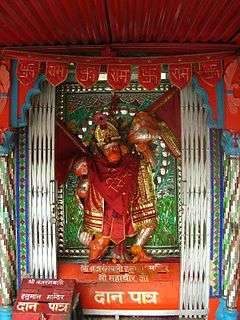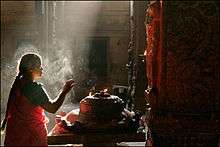Hanuman Jayanti
Hanuman is a Hindu god and divine monkey (vanara) companion of the god Rama, who wreaked havoc in Lanka. Vanar can be divided into Van and Nar. People who resides in forest.
| Hanuman Jayanti | |
|---|---|
 A Hanuman temple at Haridwar. | |
| Observed by | Hindus |
| Type | Religious |
| Celebrations | 1 day |
| Begins | Chaitra Purnima |
| Ends | Chaitra Purnima |
| 2019 date | April 19 (Fri)[1] |
| 2020 date | April 8 (Wed) in India and April 7 (Tue) EDT USA [2] |
| Frequency | annual |
Hanuman Janmotsava is a Hindu religious festival that celebrates the birth of Lord Sri Hanuman, who is immensely venerated throughout India and Nepal. This festival is celebrated on different days in different parts of India.[3] In most states of India, the festival is observed either in Chaitra (usually on the day of Chaitra Pournimaa) or in Vaishakha, while in a few states like Kerala and Tamil Nadu, it is celebrated in Dhanu (called Margazhi in Tamil).
On this auspicious day, devotees of Lord Hanuman celebrate him and seek his protection and blessings. They flock to temples to worship him and present religious offerings. In return, The devotees receive Prasad by the temple priests as sweets, flowers, coconuts, tilak, sacred ash (udi) and Ganga jal (holy water). People also celebrate him on this day by reciting various devotional hyms and prayers like the Hanuman Chalisa and reading holy scriptures like the Ramayana and Mahabharata.
Hanuman Janam-Utsav is an important festival of the Hindus. Hanuman jayanti is also biggest celebrated festival in India. Lord Hanuman is an ardent devotee of Lord Sri Rama and is widely known for his unflinching devotion to Sri Rama. Hanuman is the symbol of strength and energy. He is said to be able to assume any form at will, wield the gada (including many celestial weapons), move mountains, dart through the air, seize the clouds and equally rival Garuda in the swiftness of flight.
Lord Hanuman is worshipped as a deity with the ability to attain victory against evil and provide protection.
Birth
Lord Hanuman was born on the Anjaneri mountain. His mother Anjana was an apsara who was born on earth due to a curse. She was redeemed from this curse on giving birth to a son. The Valmiki Ramayana states that his father Kesari was the son of Brihaspati, he was the King of a place named Sumeru.[4] Anjana performed intense prayers lasting 12 long years to Rudra to get a child. Pleased with their devotion, Rudra granted them the son they sought.[5] Hanuman, in another interpretation, is the incarnation or reflection of Rudra himself.
Hanuman is often called the son of the deity Vayu (Wind God); several different traditions account for the Vayu's role in Hanuman's birth. One story mentioned in Eknath's Bhavartha Ramayana (16th century CE) states that when Anjana was worshiping Rudra, the King Dasharatha of Ayodhya was also performing the ritual of Putrakama yagna in order to have children. As a result, he received some sacred pudding (payasam) to be shared by his three wives, leading to the births of Rama, Lakshmana, Bharata, and Shatrughna. By divine ordinance, a kite snatched a fragment of that pudding and dropped it while flying over the forest where Anjana was engaged in worship. Vayu, the Hindu deity of the wind, delivered the falling pudding to the outstretched hands of Anjana, who consumed it. Hanuman was born to her as a result.[4][6] Another tradition says that Anjana and her husband Kesari prayed Rudra for a child. By Rudra's direction, Vayu transferred his male energy to Anjana's womb. Accordingly, Hanuman is identified as the son of the Vayu
Another story of Hanuman's origins is derived from the Vishnu Purana and Naradeya Purana. Narada, infatuated with a princess, went to his lord Vishnu, to make him look like Vishnu, so that the princess would garland him at swayamvara (husband-choosing ceremony). He asked for hari mukh (Hari is another name of Vishnu, and mukh means face). Vishnu instead bestowed him with the face of a vanara. Unaware of this, Narada went to the princess, who burst into laughter at the sight of his ape-like face before all the king's court. Narada, unable to bear the humiliation, cursed Vishnu, that Vishnu would one day be dependent upon a vanara. Vishnu replied that what he had done was for Narada's own good, as he would have undermined his own powers if he were to enter matrimony. Vishnu also noted that Hari has the dual Sanskrit meaning of vanara. Upon hearing this, Narada repented for cursing Vishnu. But Vishnu told him not to repent as the curse would act as a boon, for it would lead to the birth of Hanuman, an avatar of Rudra, without whose help Rama (Vishnu's avatar) could not kill Ravana.
Worship

The devotees visit temples and apply tilaka of sindoor to their foreheads from Hanuman's idol. As per legend, When Lord Hanuman found Sri Sita applying sindhūr to her forehead, He questioned her and she replied that doing so would ensure a long life for her husband, Lord Sri Rama. Lord Hanuman then proceeded to smear his entire body with sindhūr, thus ensuring Lord Sri Rama's immortality.
In Tamil Nadu and Kerala, Hanuman Jayanthi is celebrated on the New Moon day in Margazhi (Dhanu) month. Famous Hanuman temples in these states like Nanganallur, Namakkal, Suchindram, Thrikkaviyoor and Alathiyoor celebrate this day with pomp and valour.
In Telangana and Andhra Pradesh, Hanuman Jayanthi is celebrated by Diksha of 41 days beginning on Chaitra Purnima and concluding it on the tenth day during Krishna Paksha in Vaishaka.
In Maharashtra, Hanuman Jayanti is celebrated on the full moon day (pūrnima) of the Hindu lunar month of Chaitra. A special feature of Hanuman Jayanti is that according to some religious almanacs (panchāngs) the birthday of Hanuman falls on the fourteenth day (chaturdashi) in the dark fortnight of the month of Ashvin while according to others it falls on the full moon day in the bright fortnight of Chaitra. On this day in a Hanuman temple, spiritual discourses begin at dawn since Lord Hanuman was born at sunrise. During the time frame of birth, the spiritual discourse are halted and the offering of food (Prasad) is distributed to everyone.
[7]On Hanuman Jayanti sadhaks observe fasts and carry out special puja, patha and anusthan i.e. Shri Ramcharitmanas akhand patha, Srimad Bhagavad Gita patha, Srimad Bhagavad Purana patha, Srimad Vishnu Purana patha and abhishek to Lord Vishnu along with patha of Vishnu Sahasranama, Ram Nam mantra ashtjam.
Spiritual discourses are organised in most of the Hindu temples on this day. Lord Hanuman is considered as the most powerful being in all the lokas (realms).
See also
- Lord Rama
- Hanuman
References
- https://www.calendarlabs.com/holidays/hindu/hanuman-jayanti.php
- https://www.calendarlabs.com/holidays/hindu/hanuman-jayanti.php
- "Hanuman Janam-Utsav 2017 - Hindu Festivals & Calendar | TemplePurohit". TemplePurohit - Your Spiritual Destination | Bhakti, Shraddha Aur Ashirwad. Retrieved 16 December 2017.
- Encyclopaedic Dictionary of Puranas: (A-C) ; 2.(D-H) ; 3.(I-L) ; 4.(M-R) ; 5.(S-Z), pp=628-631, Swami Parmeshwaranand, Sarup & Sons, 2001, ISBN 81-7625-226-3, ISBN 978-81-7625-226-3
- Sri Ramakrishna Math (1985) "Hanuman Chalisa" p. 5
- Sri Ramakrishna Math (1985) "Hanuman Chalisa" pp. 5-6
- "Hanuman Jayanti Puja To Make Lord Hanuman Happy". Retrieved 2 October 2019.
| Wikimedia Commons has media related to Hanuman Jayanti. |

